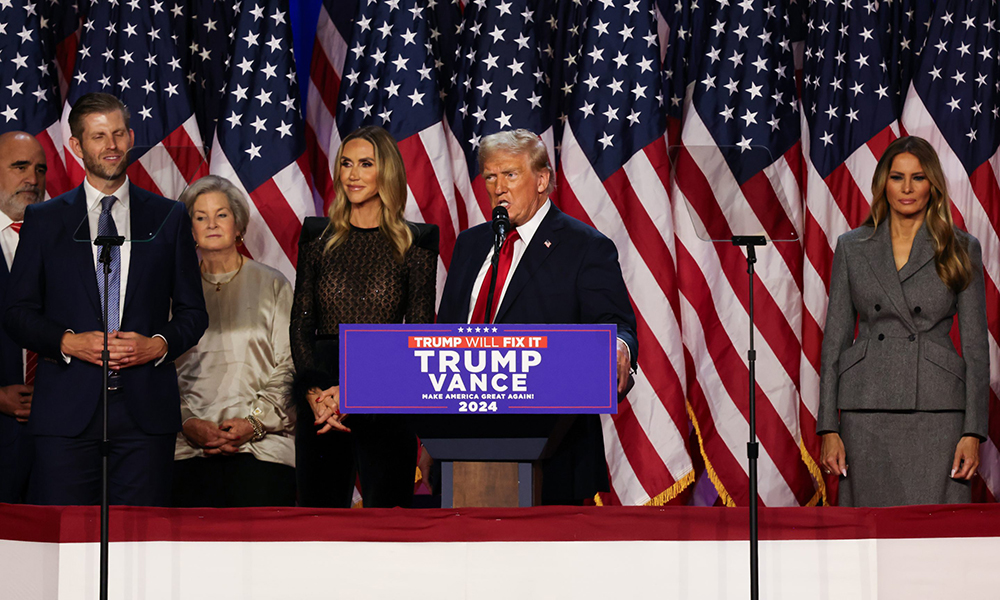
唐纳德·特朗普再次当选总统。这会带来诸多影响,但我们将重点关注他提出的经济政策,以及这些政策可能对商业造成的影响。
我们从一个备受争议的话题开始:关税。
关税是一国对从另一国进口的商品征收的税款;关税包含在产品价格当中,所以普通美国人并不经常谈论这个话题(但对经济学家来说,这却是另一回事)。你需要知道的是,正如《财富》杂志的杰夫·科尔文之前解释的那样,负责缴纳关税的是进口公司而不是出口公司。公司通常会将这部分成本尽量转嫁给消费者。
特朗普提出要对所有中国进口商品征收60%的关税,并对所有国家的进口商品征收10%的全面关税,这种做法自二战以来未曾见过。六年前,特朗普称自己为“关税侠”。今年,在竞选活动中,他强调关税可以作为一种惩罚或威胁的手段,以使其他国家遵守规则并提升美国的地位。在6月的一次集会上,特朗普表示:“我们将变得非常强硬,如果一个国家不守规矩,我们将对那个国家征收高额关税。”
但关税对普通人来说可能并非好事。根据彼得森国际经济研究所(Peterson Institute for International Economics)的数据,特朗普的关税可能使一个中等收入家庭每年额外支出1,700美元。如果像他所提到的那样,10%的全面关税实际上变成20%的全面关税,那么一个中等收入家庭每年需要多花2,600美元。
高关税不符合经济学家们所说的自由贸易;六年前,特朗普曾经说过:“贸易战是好事,容易取胜。”
有两位经济学家之前曾告诉我,他们认为在特朗普的政策方案中,关税是可能引发通胀的政策之一,另一部分是他的潜在税收政策。华尔街期待特朗普减税。特朗普呼吁将某些公司的企业税率降低到15%,他还暗示取消小费税,甚至还考虑取消联邦所得税。而且,他希望延长他在2017年第一个任期内通过的一项法律的部分内容,特别是减少所得税和遗产税的部分,这些内容将于明年年底到期。
在监管方面,他的政策并不令人意外:就像盐和胡椒通常会搭配使用一样,放松监管是共和党人的一贯主张。企业通常喜欢这种立场;加密货币领域肯定会支持这样做。但让我们花点时间考虑一下房地产行业。美联储(Federal Reserve)主席杰罗姆·鲍威尔曾表示,即使美联储已经设法抑制通胀,它依旧无法解决房地产市场的问题。住房问题可能是民众对经济普遍不满的根源,除了大规模驱逐移民外,特朗普似乎在这个问题上摇摆不定。
四年前,特朗普和他的住房与城市发展部部长本·卡尔森在《华尔街日报》上撰写了一篇评论文章,标题为《我们将保护美国的郊区》(We’ll Protect America’s Suburbs)。他们谴责废除单户住宅区划和在某些社区建造公寓。今年,在竞选活动中,在与乔·拜登竞争时,特朗普表示他将阻止拜登“废弃郊区的险恶计划”。但在接受彭博社采访时,他称区划为“破坏性因素”。一位经济学家之前告诉我,你不能一边谴责民主党对城市的严格监管,一边保护郊区,并允许它们的排斥性区划。
即使特朗普可以通过行政命令推行某些议题,我们不能忘记国会掌握着财政大权。共和党已经赢得了参议院的控制权,但众议院目前仍在争夺中。无论如何,随着特朗普胜选,如果说有一件事需要考虑,那就是许多美国人信任特朗普处理经济问题的能力——尽管经济学家预计在他任期内物价会上涨。即便如此,特朗普胜选正在推动市场大幅上涨。(财富中文网)
译者:刘进龙
审校:汪皓
唐纳德·特朗普再次当选总统。这会带来诸多影响,但我们将重点关注他提出的经济政策,以及这些政策可能对商业造成的影响。
我们从一个备受争议的话题开始:关税。
关税是一国对从另一国进口的商品征收的税款;关税包含在产品价格当中,所以普通美国人并不经常谈论这个话题(但对经济学家来说,这却是另一回事)。你需要知道的是,正如《财富》杂志的杰夫·科尔文之前解释的那样,负责缴纳关税的是进口公司而不是出口公司。公司通常会将这部分成本尽量转嫁给消费者。
特朗普提出要对所有中国进口商品征收60%的关税,并对所有国家的进口商品征收10%的全面关税,这种做法自二战以来未曾见过。六年前,特朗普称自己为“关税侠”。今年,在竞选活动中,他强调关税可以作为一种惩罚或威胁的手段,以使其他国家遵守规则并提升美国的地位。在6月的一次集会上,特朗普表示:“我们将变得非常强硬,如果一个国家不守规矩,我们将对那个国家征收高额关税。”
但关税对普通人来说可能并非好事。根据彼得森国际经济研究所(Peterson Institute for International Economics)的数据,特朗普的关税可能使一个中等收入家庭每年额外支出1,700美元。如果像他所提到的那样,10%的全面关税实际上变成20%的全面关税,那么一个中等收入家庭每年需要多花2,600美元。
高关税不符合经济学家们所说的自由贸易;六年前,特朗普曾经说过:“贸易战是好事,容易取胜。”
有两位经济学家之前曾告诉我,他们认为在特朗普的政策方案中,关税是可能引发通胀的政策之一,另一部分是他的潜在税收政策。华尔街期待特朗普减税。特朗普呼吁将某些公司的企业税率降低到15%,他还暗示取消小费税,甚至还考虑取消联邦所得税。而且,他希望延长他在2017年第一个任期内通过的一项法律的部分内容,特别是减少所得税和遗产税的部分,这些内容将于明年年底到期。
在监管方面,他的政策并不令人意外:就像盐和胡椒通常会搭配使用一样,放松监管是共和党人的一贯主张。企业通常喜欢这种立场;加密货币领域肯定会支持这样做。但让我们花点时间考虑一下房地产行业。美联储(Federal Reserve)主席杰罗姆·鲍威尔曾表示,即使美联储已经设法抑制通胀,它依旧无法解决房地产市场的问题。住房问题可能是民众对经济普遍不满的根源,除了大规模驱逐移民外,特朗普似乎在这个问题上摇摆不定。
四年前,特朗普和他的住房与城市发展部部长本·卡尔森在《华尔街日报》上撰写了一篇评论文章,标题为《我们将保护美国的郊区》(We’ll Protect America’s Suburbs)。他们谴责废除单户住宅区划和在某些社区建造公寓。今年,在竞选活动中,在与乔·拜登竞争时,特朗普表示他将阻止拜登“废弃郊区的险恶计划”。但在接受彭博社采访时,他称区划为“破坏性因素”。一位经济学家之前告诉我,你不能一边谴责民主党对城市的严格监管,一边保护郊区,并允许它们的排斥性区划。
即使特朗普可以通过行政命令推行某些议题,我们不能忘记国会掌握着财政大权。共和党已经赢得了参议院的控制权,但众议院目前仍在争夺中。无论如何,随着特朗普胜选,如果说有一件事需要考虑,那就是许多美国人信任特朗普处理经济问题的能力——尽管经济学家预计在他任期内物价会上涨。即便如此,特朗普胜选正在推动市场大幅上涨。(财富中文网)
译者:刘进龙
审校:汪皓
Donald Trump is president, again. There is a lot that comes with that, but we’ll focus on his proposed economic policies, and what it all might mean for business.
Let’s start with a hotly debated topic: tariffs.
Tariffs are taxes imposed by one country on goods imported from another country; they’re baked into prices of products, so they aren’t always talked about among typical Americans (among economists, well, that’s a different story). What you need to know is the importing company pays the tariff, not the exporting one, as Fortune’s Geoff Colvin previously explained. Companies often pass on as much of that cost as they can to consumers.
Trump has proposed a 60% tariff on all Chinese imports and a universal 10% tariff on imports from all countries, a practice unseen since World War II. Six years ago, Trump called himself “a Tariff Man.” This year, on the campaign trail, he stressed tariffs can be used as a penalty or threat of sorts to keep other countries in line and elevate America. At a rally in June, he said: “We are going to be so tough, and if a country is not going to behave, we’re going to tariff the hell out of that country.”
But tariffs might not actually be great for everyday people. His tariffs could cost a middle-income household $1,700 a year, according to the Peterson Institute for International Economics. If that 10% universal tariff were to actually be a 20% universal tariff, which he has floated, it would cost that same middle-income household $2,600 a year.
Higher tariffs do not go hand in hand in with what economists call free trade; and again, six years ago, Trump said, “trade wars are good, and easy to win.”
Two economists previously told me tariffs were one part of Trump’s policy proposals they considered inflationary, another was his potential tax policies. Wall Street is anticipating lower taxes, for one. Trump has called for lowering the corporate tax rate to 15% for certain companies, he’s teased an end to taxing tips, and he’s even flirted with eliminating federal income taxes. Not to mention, he wants to extend parts of a 2017 law passed in his first term, particularly income and estate tax cuts, that are set to expire at the end of next year.
And in terms of regulation, his policies aren’t very surprising: Republicans and deregulation often gang together like salt and pepper. Businesses typically love that; crypto definitely does. But let’s take a moment to consider the world of housing, something Federal Reserve Chair Jerome Powell has said the central bank can’t fix, even if it has managed to tamp inflation down. Housing could be at the root of this widespread dissatisfaction with the economy, and apart from mass deportation, Trump seems to waffle on the issue.
Four years ago, Trump and Ben Carson, his secretary of Housing and Urban Development, wrote a commentary in the Wall Street Journal titled: “We’ll Protect America’s Suburbs.” They condemned abolishing single-family zoning and building apartments in certain neighborhoods. This year, on the campaign trail, when he was still running against Joe Biden, Trump said he’d stop Biden’s “sinister plan to abolish the suburbs.” But in an interview with Bloomberg, he called zoning “a killer.” You can’t punish blue cities for strict regulations while protecting suburbs and allowing their exclusionary practices, an economist previously told me.
Congress holds the power of the purse though, we can’t forget that, even if there are things Trump can implement via executive order. Republicans have won control of the Senate, but the House is still up for grabs, at the moment. Either way, if there is one thing to consider with this Trump win, it’s that a lot of Americans trust him with the economy—that is despite the fact that economists expect prices to rise under him. Even so, markets are surging on his win.






